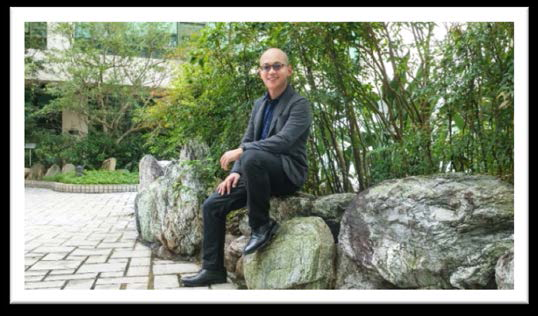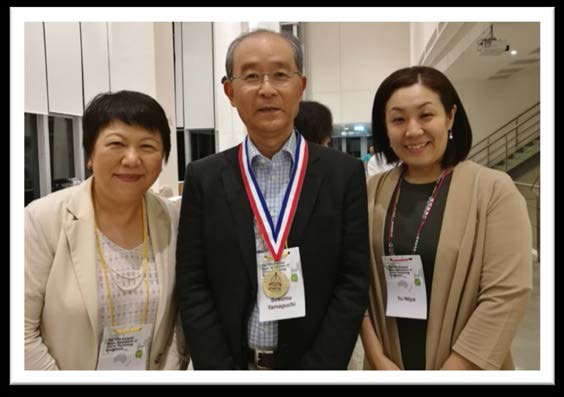Misumi Award
Chang, C. T., Lee, Y. K., & Cheng, Z. H. (2017). Baby face wins? Examining election success based on candidate election bulletin via multilevel
modeling. Asian Journal of Social Psychology, 20(2), 97-112.
Dou, K., Wang, Y. J., Li, J. B., Li, J. J., & Nie, Y. G. (2018). Perceiving high social mindfulness during interpersonal interaction promotes cooperative behaviours. Asian Journal of Social Psychology, 21(1-2), 97-106.
The award is given to the author(s) of the article in the Asian Journal of Social Psychology of which contribution to the development of social psychology in Asia is most prominent.
KS Yang Travel Award:
Chee-Seng Tan
The award is administered by the AASP to provide financial assistance for deserving young scholars from developing countries to attend the AASP conference.
Kuo Shu Yang Medal:
Susumu Yamaguchi
I am very honored to receive the Kuo Shu Yang Medal at the 13th conference of AASP in Taipei, especially because the award bears late Prof. Yang’s name. He led indigenous psychology movements in Taiwan specifically and Asia more generally. I made a keynote presentation entitled “Importance of Indigenous Perspectives in Asian Social Psychology: A legacy of late Prof. Kuo-Shu Yang” at the conference.
In my presentation, I focused on a research project that followed Yang’s guideline. First, we picked up a phenomenon which is apparently unique in the Japanese culture, in the sense that it cannot be predicted by the mainstream psychology. Specifically, we focused on a bias among Japanese that they hold exaggerated sense of being ordinary. This phenomenon, which we termed super-ordinary bias would not be predictable in the mainstream psychology, because individuals described in the mainstream psychology textbooks are supposed to enjoy being unique (which is opposite of being ordinary). In our study, unlike the mainstream psychology, we predicted that Japanese can maintain their positive self-evaluation with their self-concept of being ordinary (or futsu in Japanese). Actually, we confirmed that Japanese have favorable impressions about an ordinary person. An ordinary person was found to be perceived as having more desirable traits such as attractiveness and intelligence. In a follow-up experiment, Japanese students tended to predict that they are more likely to experience common events rather than rare events, compared with average students. These findings must be surprising for those who have been immersed in the mainstream psychology.
Then, we attempted to test the phenomenon in another culture, which is suggested by Yang to construct a global psychology. Interestingly, the super-ordinary phenomenon was confirmed in the U.S. as well. Although individuals in the U.S. are supposed to competitively seek for self-esteem or uniqueness, they apparently see positive meaning in being ordinary as well.
These findings suggest that cultural difference between Japan and the U.S. is not so simple as once believed. Because previous studies in Japan have established the existence of “need for uniqueness” among Japanese (like Americans), the available evidence would lead us to draw a different picture: uniqueness and ordinariness are positively valued in both cultures and the difference lies in the relative strength of need for uniqueness and ordinariness — probably need for uniqueness is stronger among Americans and need for ordinariness is stronger among Japanese.
I would like to argue that the revelation of super-ordinary bias in Japanese culture and a successful replication in the U.S. point to the importance of indigenous perspectives in Asian Social Psychology. We can start from our indigenous phenomenon in Asia and contribute to the construction of “balanced global psychology” as Yang has correctly pointed out 30 years ago. Hopefully we will see more indigenous research in Asian cultural contexts.
Michael Harris Bond Award:
Ronnel B. King
This award is given to most outstanding early career of Asian-based scholar of social psychology.
 Ronnel B. King from The Education University of Hong Kong has been awarded the Michael Harris Bond Early Career Award by the Asian Association of Social Psychology. The award is given to early career researchers who have made significant contributions to Asian social psychology.
Ronnel B. King from The Education University of Hong Kong has been awarded the Michael Harris Bond Early Career Award by the Asian Association of Social Psychology. The award is given to early career researchers who have made significant contributions to Asian social psychology.
The award recognizes Dr King’s work on the socio-cultural aspects of student motivation and well-being.
Dr King also delivered a keynote speech, “The Great Divide: How Income Inequality Harms Student Motivation and Achievement”. It focused on how income inequality shapes educational achievement across countries and the temporal relations between inequality and educational achievement.
Dr King said “I feel very honoured and grateful to receive the Michael Bond Award, named after one of the giants of Asian social psychology. I have always been a fan of Michael Bond’s work. When I first came to Hong Kong to do my PhD, my supervisor Prof. David Watkins at The University of Hong Kong asked me to read The Oxford Handbook of Chinese Psychology edited by Michael Bond. Michael’s work shaped my research development to a significant extent.
As for the Asian Association of Social Psychology, I have been attending its conferences for the past 10 years. The first time was in India when I was just a first-year PhD student (2009) and I was part of the summer school. I never thought that I will be the one to give a keynote this year as part of the award.
Even more interesting was the fact that two of my mentors Prof Tina Montiel, my undergraduate thesis supervisor, and Prof Allan Bernardo, one of my most important mentors, were in the audience when I gave my keynote speech. I felt this was one of the best ways to honour my teachers who have taught me so much. I also feel very grateful to my collaborators, students, and research staff who have made research interesting, fun, and meaningful.”

